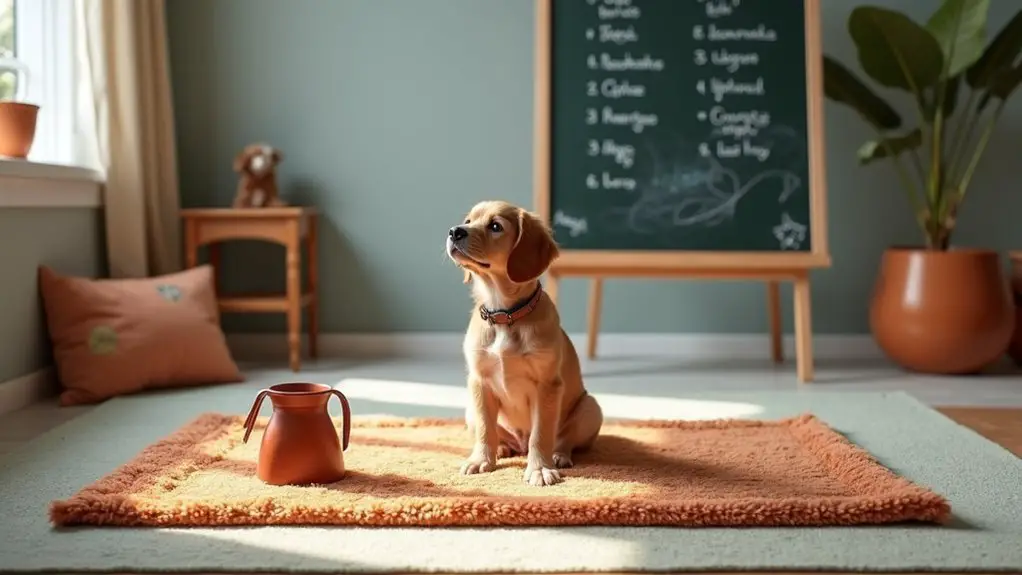Envision this: a wagging tail, a slobbery kiss, and a little bundle of joy just begging for your attention. If you’re thinking about welcoming a dog into your home for the first time, choosing the right breed can feel like finding the perfect recipe. Some pups are super chill couch potatoes, while others are playful athletes. So, what’s the best match for your style? Let’s explore some top breeds that could just steal your heart.
Top Recommended Breeds
When it comes to choosing your first furry friend, the options can feel overwhelming—like staring at an endless menu without knowing what to pick.
So, let’s narrow it down. The best dog breeds for first-time dog owners typically include the Labrador Retriever, Golden Retriever, and Poodle. These breeds are friendly, easy to train, and just plain loveable.
Visualize this: a wagging tail, big, warm eyes greeting you after a long day. Can you imagine that joy?
You might want something that won’t eat your shoes or chew up the furniture—right? These breeds generally adapt well to new families and environments.
Choosing wisely can lead to endless cuddles and unforgettable adventures together. So, dig in and find your perfect match.
1. Labrador Retriever Essentials
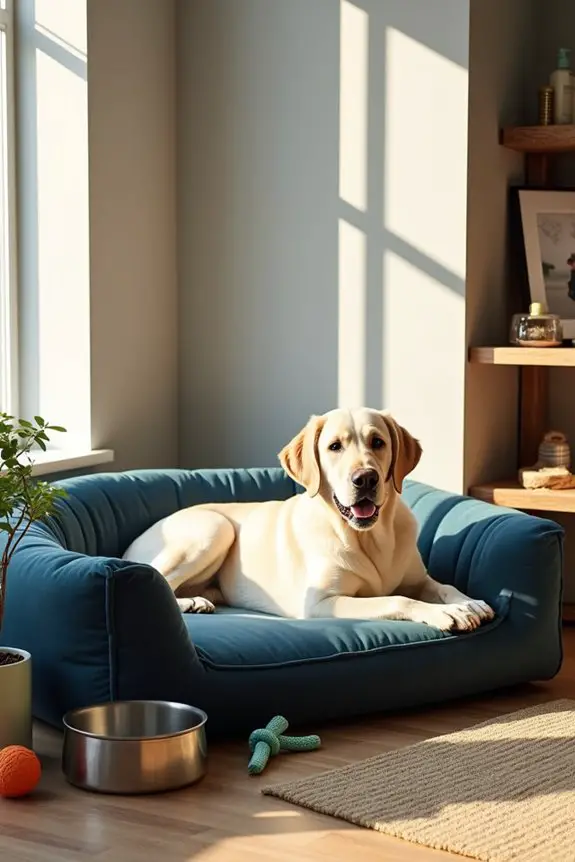
Getting ready to welcome a Labrador Retriever into your home? That’s a fabulous decision! Labs are like those loyal friends who always show up when you need a pick-me-up, not to mention they’re one of the most adaptable breeds out there. Their spirit is contagious, and they seem to be made of sunshine and wagging tails.
Having a Lab means you’re signing up for endless love, companionship, and all the adventures you can handle. So, let’s jump into the essentials you’ll need to create a comfortable and happy life for your new furry buddy.
Design/Styling Tips:
- Space: Create a cozy corner for your Lab with a quality dog bed (the bigger, the better, because Labs love to sprawl). Look for one that has a washable cover—trust me, after bath time or muddy walks, you’ll thank yourself. Regular use of cleaning supplies is essential to keep their space fresh and inviting. Consider enhancing your pup’s experience with luxury dog training equipment to ensure a rewarding training process.
- Toys: Stock up on durable chew toys and interactive puzzles. Labs are active and love to engage their minds. Choose toys that can withstand some rough play, like rubber chew toys or tug ropes.
- Feeding Setup: Invest in a sturdy, non-slip food and water bowl set. Consider adding a mat underneath to keep the area tidy—no one enjoys stepping in water puddles.
- Grooming Supplies: Labs shed… a lot. Keep a high-quality brush handy for those regular grooming sessions to cut down on your vacuuming duties and keep that coat shiny and healthy.
- Safety First: Make sure your home is Lab-proof. Keep hazardous items out of reach, and secure items that you don’t want chewed—like, say, your favorite pair of shoes. (It’s usually better to have that training session instead of tears over the chewed-up evidence.)
Additionally, don’t forget to consider investing in luxury dog winter gear to keep your Lab cozy during colder months.
Optional Variation:
On a budget? Consider DIY toys, like a braided fleece tug rope made from old t-shirts. Watching your furry friend love something you crafted out of old material can feel incredibly rewarding. Plus, it keeps cash in your pocket for doggy treats.
And if you’re feeling fancy, splurge on a custom dog bed with your Lab’s name embroidered—because who doesn’t love a little personalization to show off their furry child?
In the end, the heart of the matter is that your Labrador will thrive in a space that’s comfortable, engaging, and safe. Make sure you’re ready for belly rubs, slobbery kisses, and all the love this breed has to offer. Isn’t that what every pet parent dreams about?
2. Golden Retriever Temperament
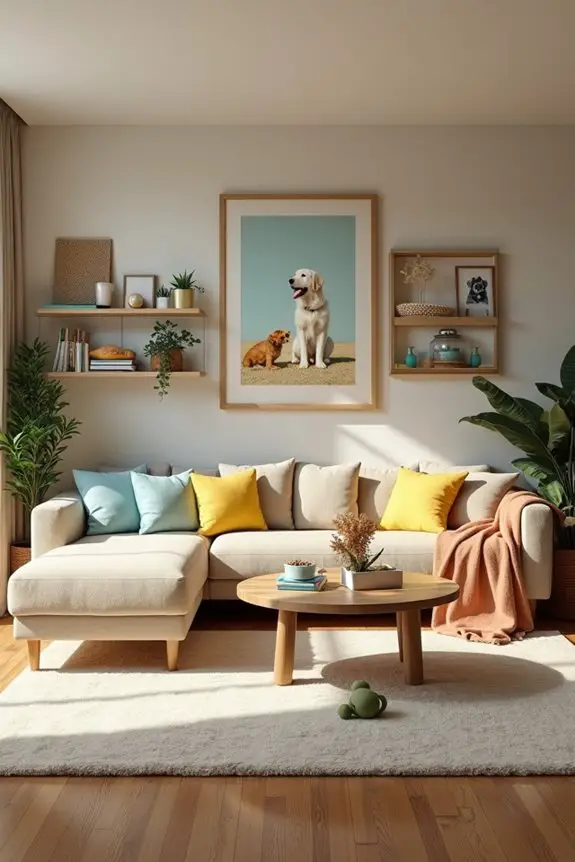
So, you’re thinking about adding a Golden Retriever to your family? You’re on the right track. These pups are the epitome of what it means to be a gentle friend, with a temperament that’s as sunny as their golden coats. Their friendly nature makes them fantastic companions, especially for first-time dog owners. You might even say they’re the lovable, floppy-eared ambassadors of the dog world, always enthusiastic to make you smile.
Golden Retrievers are the ultimate gentle companions, spreading joy and smiles with their sunny dispositions and floppy ears.
What’s more, their temperament isn’t just about being sweet and cuddly. Goldens are intelligent, energetic, and totally devoted to their humans. They thrive on companionship and need plenty of social interaction, making them great for families, singles, or anyone looking for a loyal buddy. However, it’s also important to understand their needs to guarantee that your Golden feels right at home. Additionally, teaching the quiet command can help maintain a peaceful household and improve your dog’s behavior around guests. Goldens also have (a strong need for high-quality dog food) to support their health and energy levels.
Design/Styling Tips:
- Social Space: Create a warm, inviting area where your Golden can interact with family and friends. Consider an open layout in your living room with comfy seating where they can lounge nearby while you socialize.
- Play Area: Designate a safe space either indoors or outdoors for play. Use soft outdoor rugs or cushioned mats where they can romp around without hurting their paws.
- Leash and Collar: Choose a comfy collar and a sturdy leash that suits their playful nature. Opt for colorful designs or patterns that reflect their cheerful personality.
- Training Zone: Have a specific area for training sessions with minimal distractions. Use soft mats or rugs to help them feel relaxed during practice and keep some delicious treats nearby to reward good behavior.
- Visual Decor: Incorporate dog-themed art or photos of your Golden around the house to add a personalized touch. Your home will feel even more like a pet-friendly haven.
Optional Variation:
On a budget? Check out local thrift stores for playful and unique décor items that can showcase your Golden’s lovable personality. Maybe a vintage dog bowl can act as a cute piece on display or a cozy blanket is a great addition to your training zone.
Or, if you want to go all out, consider custom-made pet portraits—the kind that brings out their unique sparkle, because who doesn’t want a selfie of their furry friend immortalized on canvas?
Ultimately, understanding your Golden Retriever’s temperament will help you create a loving environment that meets their needs while filling your home with joy and laughter. Plus, with their affectionate nature, you’ll be treated to endless cuddles and slobbery kisses. What’s better than that?
3. Beagle’s Friendly Nature
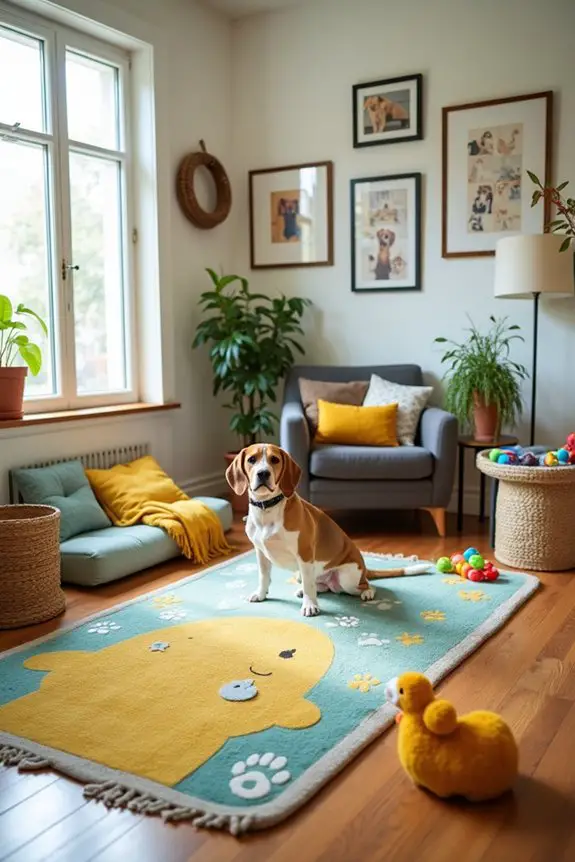
Beagles are like those friends who are always up for a good time—their playful energy and friendly demeanor make them perfect for first-time dog owners. These pups have an innate ability to charm everyone they meet, and with their adorable, soulful eyes and wagging tails, you can’t help but smile.
If you’re looking for a breed that fits perfectly into your social life and loves to be around other people and pets, then a Beagle might just be your new best friend.
Ready to embrace the joy of having a Beagle? Here are some fun ideas to help you create an inviting atmosphere for your friendly little buddy!
Design/Styling Tips:
- Open Spaces: Beagles are curious by nature, so they thrive in open spaces. Create a cozy layout in your home that encourages interaction. Move furniture around to create a welcoming pathway where your Beagle can weave in and out, exploring every nook and cranny.
- Social Hub: Set up a designated play area that fosters socialization. Consider a colorful doggy rug in the living room or backyard where your Beagle can mingle with family and friends. Having plush dog beds nearby makes for quick lounging between play sessions.
- Fun Décor: Incorporate dog-themed accents like framed pictures of Beagles or playful artwork featuring their quirky expressions. This not only celebrates your pup’s personality but also warms your space with their contagious charm.
- Training Area: Beagles can be a bit stubborn (it’s that hunting instinct, you see). Have a specific spot for training sessions, featuring toys, treats, and comfy mats. Keep your voice cheerful and make training fun. Your Beagle will be more inclined to cooperate if they sense that good times are on the horizon.
- Chew and Play Zone: Since Beagles are notorious chewers, consider a dedicated chew-proof area brimming with toys. Rubber toys are durable and can withstand even the most persistent nibbles, while plush toys offer a softer option for those quieter moments.
Optional Variation:
On a budget? Get creative with your décor! Thrift stores often have unique finds. Look for vintage baskets to create a stylish storage solution for your Beagle’s toys. Not only does it keep your space tidy, but it also adds a touch of rustic charm to your home.
Or, if you’ve got a bit more to splurge, think about a custom-made dog bed that mirrors your home’s aesthetic—because a stylish Beagle deserves a stylish place to rest.
4. French Bulldog’s Low Energy
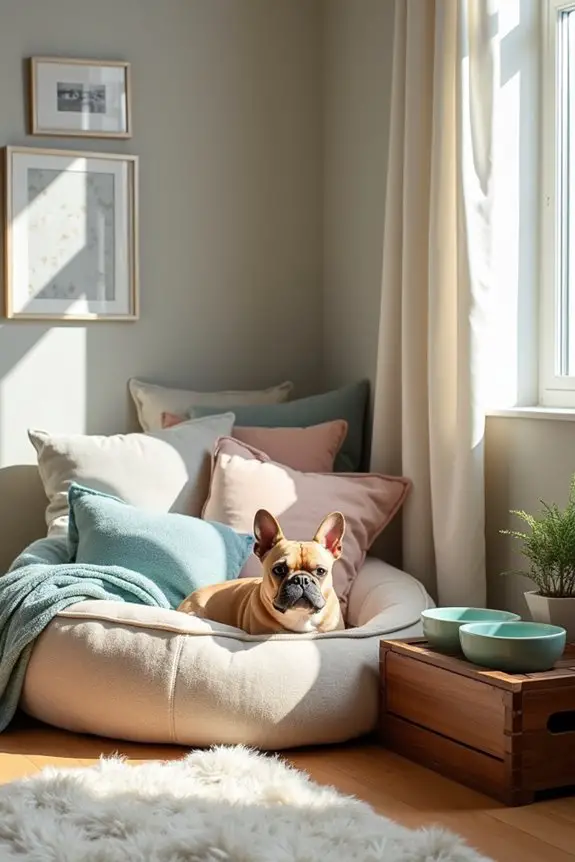
When it comes to choosing a dog for the first time, the French Bulldog is like the coziest blanket on a chilly winter night. With their lower energy levels, they’re the perfect companion for those who prefer a more laid-back lifestyle.
Think about it—no need for marathon runs or hours of fetch. Frenchies are content with a few short walks and snuggles on the couch, making them an ideal fit for busy folks or anyone who enjoys a slower pace.
Design/Styling Tips:
- Comfy Nook: Create a dedicated spot for your French Bulldog to lounge. A plush dog bed in the corner of your living room, surrounded by soft blankets and pillows, gives them their own cozy retreat. Bonus points if it’s near a heat register or sunny window!
- Gentle Access: Keep essentials like food and water within easy reach for your Frenchie. A stylish feeding station with elevated bowls can add a chic touch to your kitchen or dining area while being gentler on their neck.
- Minimalist Decor: Embrace a simple décor style that matches your Frenchie’s clean lines. Use soft colors and subtle patterns to create a calming environment. Think pastels or monochromes that support that chill vibe they radiate.
- Puppy-Proofing: French Bulldogs can be prone to health issues, so make certain your home is safe with rounded corners and minimal clutter. Consider some stylish storage solutions that hide away any tiny danger zones that could trip up both you and your pup.
Optional Variation: On a budget? Use furniture you already have to create a cozy spot for your Frenchie. Grab some cushions from the couch or a throw blanket to create their perfect nook.
If you’re feeling crafty, turn an old wooden crate into an adorable bed with soft blankets inside—it’ll look great and cost very little. Plus, you can brag about your DIY skills to friends.
5. Poodle’s Intelligence and Trainability
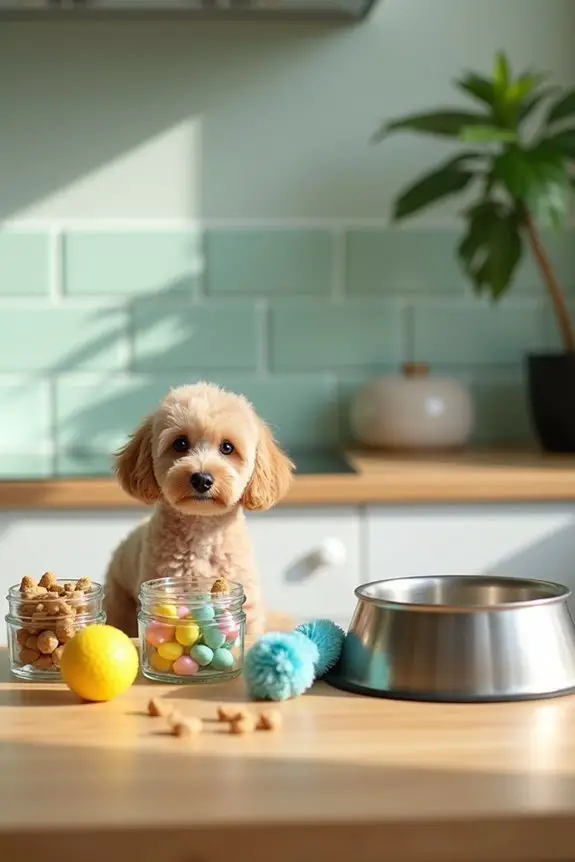
When it comes to choosing a dog for first-time owners, the Poodle stands out not just for their fluffy appearance but also for their brains. Seriously, these pups are like the Einstein of the dog world. Their intelligence makes them incredibly easy to train, which is a major win for new pet parents who may not have experience.
Poodles are the perfect choice for first-time dog owners—intelligent, easy to train, and irresistibly cute!
Plus, that quick thinking combined with their playful spirit can add a vibrant energy to your home, creating a joyful atmosphere. Just think of all the tricks you can teach them, from simple sit-and-stay commands to perhaps even a party trick or two. Who doesn’t want a dog that can impress their friends?
Design/Styling Tips:
- Training Corner: Set up a comfortable training area where you and your Poodle can focus. Use soft mats or rugs to create a cozy space, keeping distractions minimal. Having a designated spot helps establish a routine while looking stylish in your living room.
- Interactive Toys: Invest in fun and engaging toys that stimulate their minds. Puzzle toys or treat-dispensing balls can keep your Poodle entertained and reduce boredom. Choose bright colors that match your home décor for a seamless blend.
- Personalized Gear: A custom collar and leash not only showcase your Poodle’s personality but also add a trendy touch during walks. Consider colors and styles that complement your vibe—think pastels for a soft look or bold patterns for a fun twist.
- Training Treats Station: Create a chic spot in your kitchen for training treats with a decorative jar or container. Keeping them handy encourages you to reward your pup and makes training sessions feel special.
Optional Variation: On a budget? You don’t need fancy toys to keep your Poodle engaged. Consider making your own DIY puzzle toy by hiding treats in an old muffin tin and covering them with tennis balls. It’s affordable, entertaining, and a great way to keep your pup active without breaking the bank.
6. Affectionate Cocker Spaniel
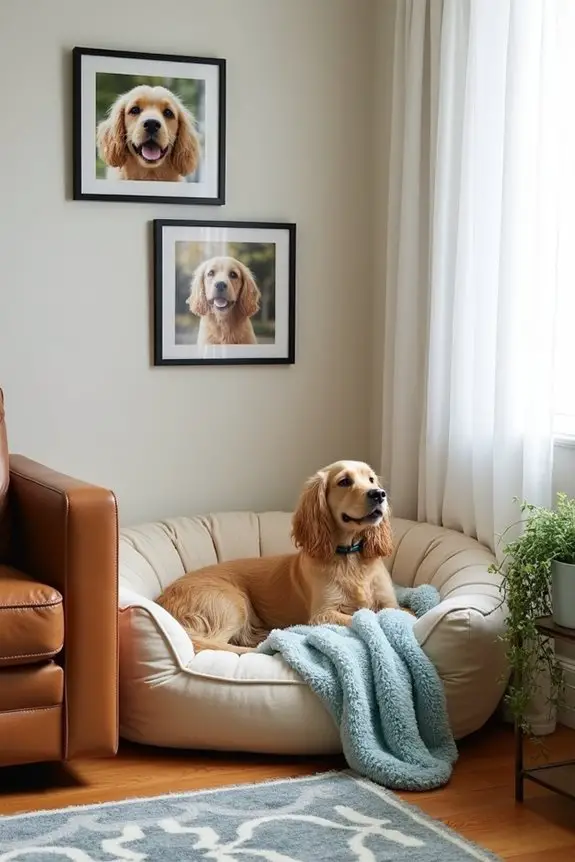
When it comes to picking a pooch for the first time, the affectionate Cocker Spaniel is a delightful contender. Known for their loving nature, these dogs thrive on companionship, making them perfect for families or individuals looking for a loyal friend.
With their floppy ears and soulful eyes, they can melt hearts in seconds. Plus, their playful yet gentle demeanor encourages bonding, so you can feel confident that your Cocker Spaniel will be a cherished member of the family right from day one.
Design/Styling Tips:
– Cozy Cuddle Zone: Create a comfy nook in your home where your Cocker Spaniel can snuggle up with you. A plush dog bed or a soft throw blanket placed near your couch not only provides a cozy retreat for your pup but also fits right into your living room decor.
Consider using washable covers, so cleanup is a breeze.
– Playful Décor: Incorporate whimsical dog-themed decor in your living space. Picture frames with photos of your Cocker Spaniel, or even some cute artwork celebrating the breed adds a personal touch.
7. Shih Tzu’s Adaptable Nature
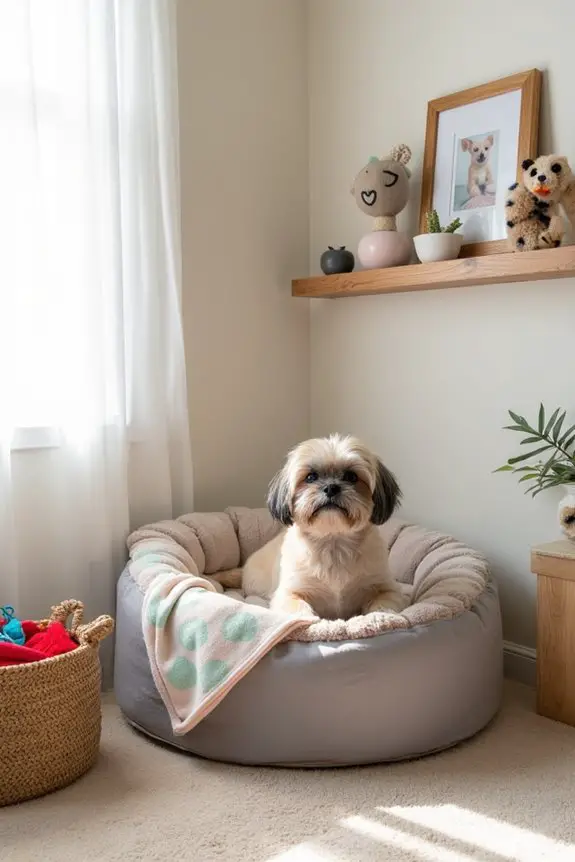
If you’re a first-time dog owner wondering which breed will easily fit into your life, search no more than the Shih Tzu. Known for their endearing personalities and friendly demeanor, these little furballs adapt beautifully to various living situations, from busy households to cozy apartments.
Their affectionate nature means they thrive on human interaction, making them enthusiasts for everything you do—from lounging on the couch to joining you for the occasional outing. Plus, their charming looks and playful antics will have you both laughing and falling in love in no time.
Design/Styling Tips:
- Flexible Living Space: Create a Shih Tzu-friendly zone in your home where they’ll feel safe and happy. A small dog bed or crate placed in a quiet corner can serve as their retreat. Use cozy blankets and pillows that reflect your home’s color scheme, blending functionality with style.
- Decorative Essentials: Incorporate dog-friendly décor that highlights your love for your Shih Tzu. Think stylish storage solutions like wicker baskets for toys or an eye-catching leash holder by the door. Personal touches like framed photos of your pup will add warmth to your space.
- Toy Display: Instead of hiding them away, showcase your Shih Tzu’s favorite toys on a charming shelf or in a decorative bowl. This adds a playful element to your décor while keeping your floor clutter-free.
Optional Variation:
On a budget? You can create a cozy nook for your Shih Tzu using inexpensive items from a thrift store or a local flea market. Look for a cute basket and a soft blanket that can be easily washed.
For a touch of personalization, DIY some cute signs that say “Shih Tzu’s Spot” to hang nearby. If you’re feeling fancy, consider investing in a plush custom dog bed that fits not only your pup’s comfort but your overall decor theme as well.
8. Mastiff’s Gentle Family Guardian
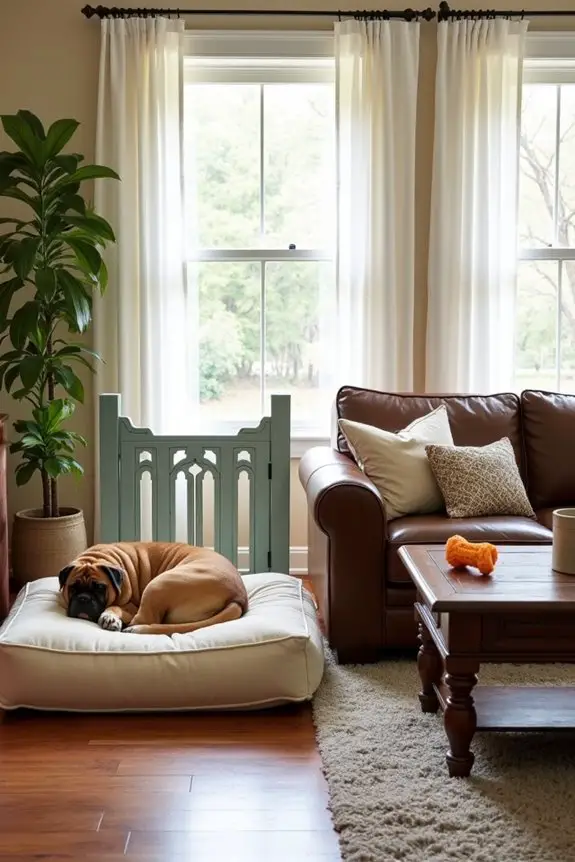
If you’re on the hunt for a dog that’s not only protective but also gentle and loving, seek no further than the Mastiff.
These gentle giants may seem intimidating with their large size and fierce demeanor, but they’re known for their affectionate nature, especially towards families. Mastiffs are incredibly loyal and will go to great lengths to protect their loved ones, making them the perfect family guardian.
Plus, their laid-back attitude means they’re perfectly content to lounge around the house, bringing a warm, comforting vibe to your space. What could be better than a furry friend who’s both your watchful protector and a big, lovable cuddle buddy?
Design/Styling Tips:
- Spacious Living Area: Give your Mastiff plenty of room to move around. If you can, designate a cozy corner in the living room for their bed or mat – the bigger, the better for these big pups. A nice washable mat can be both functional and stylish, and it’ll keep your floor looking good while accommodating your dog’s needs.
- Durable Décor: Choose sturdy furniture that can withstand some enthusiastic play sessions. Leather or faux leather couches are excellent options that look good and can handle messes better than fabric.
- Protective Accessories: Consider installing a decorative dog gate that matches your home’s decor. This way, when you need to limit their access, it can still look stylish. There are lovely wood designs that can add a rustic charm, while painted models can add a pop of color.
Optional Variation:
Planning for a budget? You can find large dog beds at discount retailers or online. Look for clean lines and neutral colors that can fit in with your existing décor.
If you’re feeling crafty, you could even sew your own dog blanket from soft fabric remnants, giving your Mastiff their own cozy fort without breaking the bank.
For a luxury touch, think about investing in a custom-made dog bed that offers both support for their joints and a chic design that complements your home’s aesthetic.
After all, if we’re honest, they might take it over as their throne anyway.
9. Small Dog Breeds for Beginners
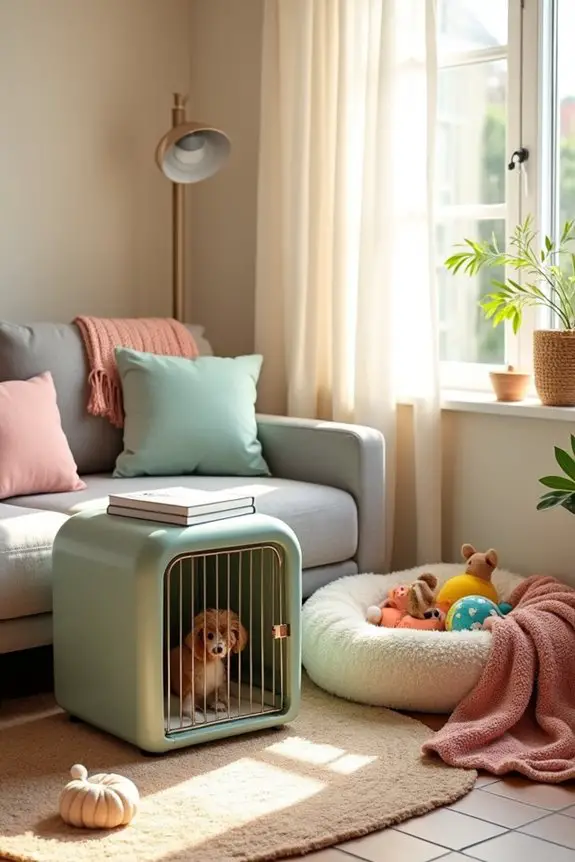
If you’re a first-time dog owner and love the idea of having a furry companion, small dog breeds might be the perfect fit for your lifestyle. These pint-sized pups are often easier to manage, require less space, and bring joy and cuddles without the overwhelming energy that some larger breeds can have.
With their compact size, they excel in both urban apartments and cozy homes, creating a vibrant and lively ambiance in any environment.
Design/Styling Tips:
- Compact Living Solutions: Invest in space-saving pet furniture, like a stylish dog crate that doubles as a side table. This way, your small dog has a cozy spot while also blending seamlessly with your decor.
- Themed Accessories: Choose bowls and toys that match your home’s color scheme. Look for fun patterns but make sure they’re durable enough to stand up to your little one’s playful antics.
- Cozy Corner: Designate a small, comfortable nook in your home for your new friend to curl up. A soft dog bed or a plush blanket in this area can turn it into their personal oasis, keeping them happy and snug when they need a break.
Optional Variation:
If you’re keeping an eye on your budget, keep an eye out for local yard sales or second-hand shops for adorable dog beds and toys. You could even repurpose a wicker basket as a charming bed – just add a cushion and voila, you have a cozy spot that adds character without costing a fortune.
On the flip side, for a luxurious upgrade, consider investing in designer dog gear that matches your aesthetic, like a beautiful handcrafted dog bed or trendy pet clothing that lets your pup flaunt their style. Who says only humans get to be fashionable?
Small dogs can fit into the fabric of your life beautifully, bringing joy and companionship without overwhelming your space.
Just imagine curling up on the couch together after a long day, sipping tea while your tiny friend snoozes beside you. Sounds perfect, right?
10. Essential Training Techniques
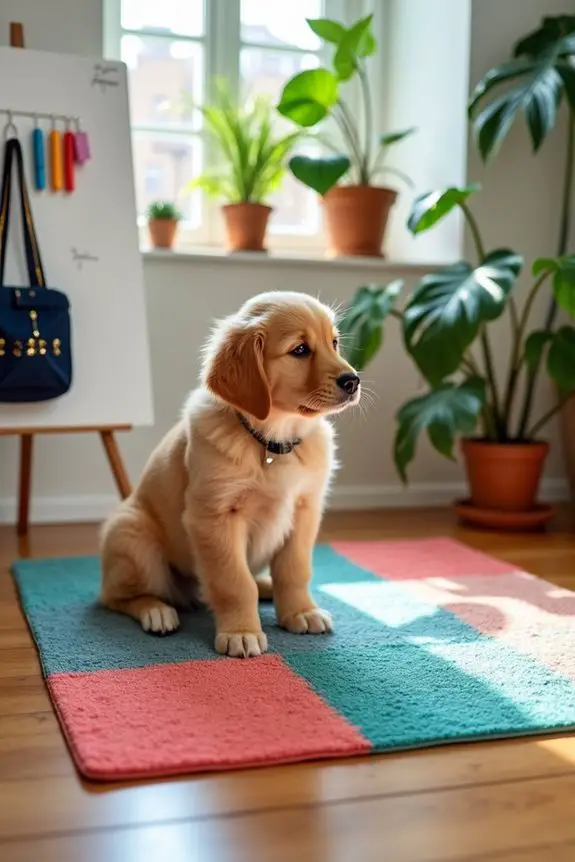
As a first-time dog owner, setting the stage for successful training is essential for building a strong bond with your furry friend. By employing effective training techniques early on, you’ll establish healthy habits, encourage good behavior, and create a sense of trust.
Plus, with a little patience and consistency, you’ll find that teaching your pup new tricks can actually be a delightful way to enhance your connection and enjoy some quality time together.
Design/Styling Tips:
- Structured Training Area: Choose a quiet space in your home that’s free from distractions. Lay down a colorful rug to create a dedicated training zone – it’s a simple way to keep your dog engaged while adding a touch of style.
- Training Tools: Invest in clickers, treat pouches, and dog mats that aren’t only functional but also aesthetically pleasing. Look for materials that are easy to clean, as training sessions can get a bit messy.
- Visual Aids: Use a whiteboard or a chalkboard to write down training goals or commands you’re working on. Not only does this serve as a helpful reminder for you, but it also adds a fun and interactive element to your home aesthetic.
Optional Variation:
If your wallet is feeling a little light, don’t worry. You can easily adapt your training space with DIY solutions. Try using an old blanket as a training mat, or even a simple cardboard box as a clicker holder.
On the other hand, if you want to indulge a bit, consider purchasing a stylish treat pouch that doubles as a fashion accessory. You could be out and about, looking sharp while rewarding your pup for mastering that sit command.
Daily Exercise Suggestions
Daily exercise isn’t just a nice addition to your dog’s routine; it’s absolutely essential for keeping both their body and mind happy.
Think about it. A tired dog is a well-behaved dog, right? Aim for at least 30 minutes of activity each day. Mix it up! Go for a brisk walk, play fetch, or enroll in a doggy agility class. Your dog will love the mental stimulation!
A tired dog is a happy dog! Aim for 30 minutes of varied activities daily for a joyful pup.
Got a little couch potato? Try shorter bursts of activity. Even puppy playdates can spark joy!
And hey, you can join in the fun. Who doesn’t love laughing at their own clumsiness while dodging a flying frisbee? Just remember, exercise isn’t just about burning calories; it’s a chance to build that beautiful bond with your furry friend.

Hi, I’m Ali Tarek, the founder of Animalsman. I’ve always been passionate about pets, especially dogs and cats, and I created this website to share practical tips, easy recipes, and helpful care advice for fellow pet lovers. My goal is to make pet care simple, enjoyable, and accessible for everyone. When I’m not writing or curating content, you’ll usually find me spending time with my furry friends or learning new ways to keep them happy and healthy.

